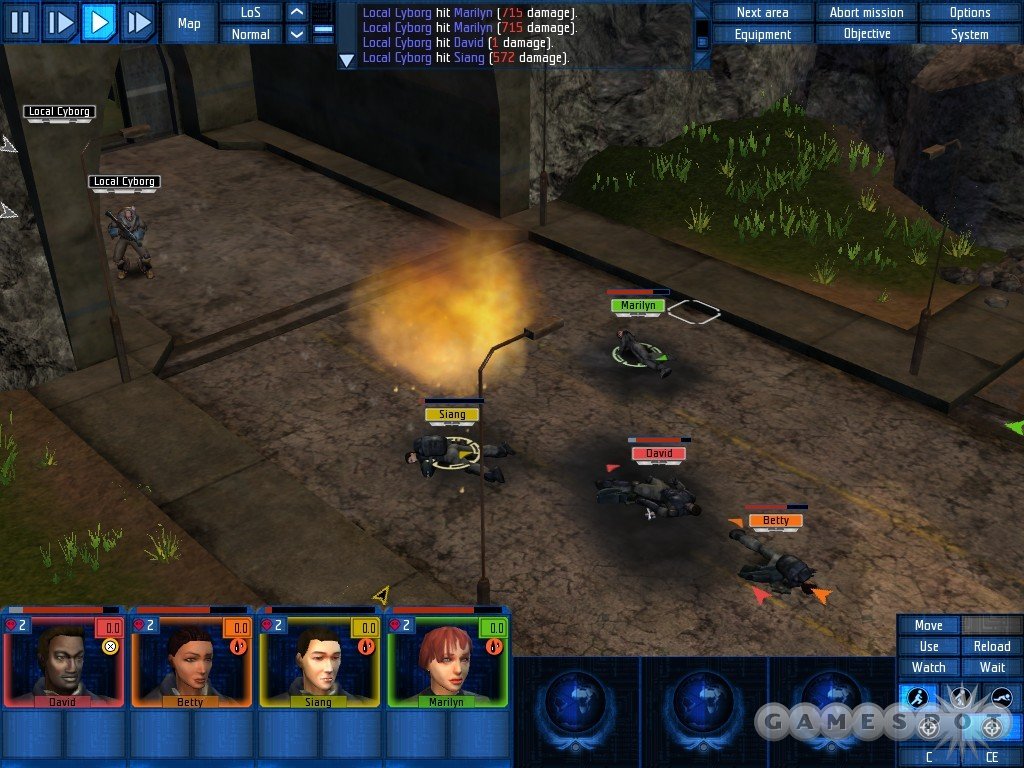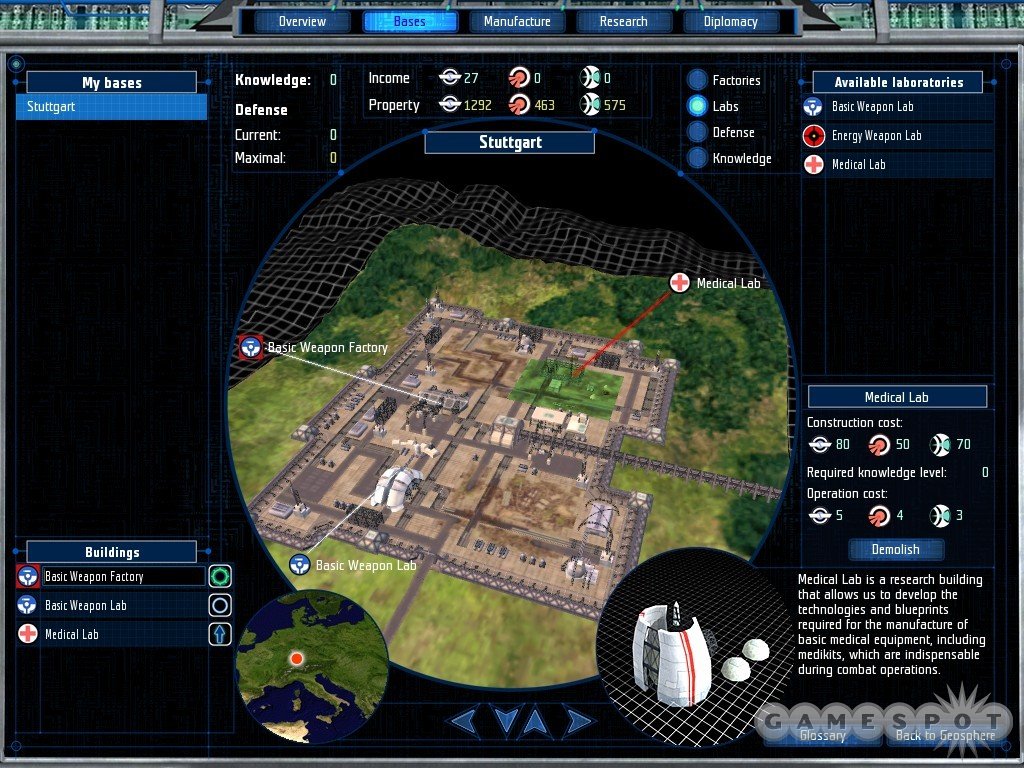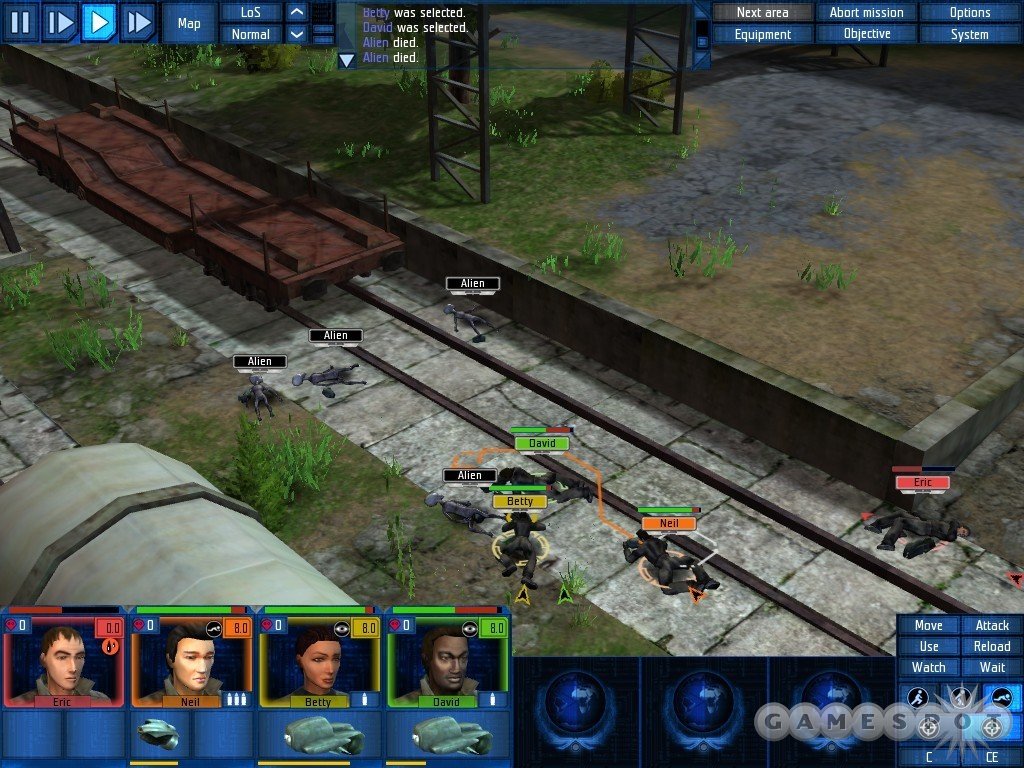For more than a decade, fans of X-COM: UFO Defense have been waiting for someone to recapture the addictiveness of saving the Earth, one crashed flying saucer at a time. Altar Interactive arguably came closest to achieving this goal in 2003, when it released UFO: Aftermath. But while this game got the squad battles right, it got a lot more wrong. It even stripped away the strategic elements that helped make X-COM one of those compulsive games you would load up for a half hour and wind up playing into the wee hours of the morning. Enter UFO: Aftershock, not so much a sequel as an attempt to convince critics that Altar really can properly rip-off X-COM. And the developer does do a better job of copying the formula behind the MicroProse oldie here, adding in base-building, research, and even resource collection. But the heart still isn't there; this game suffers from too much dreary repetition, technology that is too easy to acquire and research, and loads of bugs and design flaws that make the game very difficult to play in spots.

The story begins roughly where one of the conclusions of the original game left off, so consider this the aftermath of the aftermath. Fifty years have passed since the Council of Earth accepted the alien Reticulan request to join in its apocalyptic experiment that killed billions to create a godlike being called the Biomass. Playing mad scientist didn't quite go as expected, however, and you return from exile aboard an orbiting ship called a Laputa to find that the Biomass has messed up both the humans who remained behind and the aliens who opened this can of intergalactic worms in the first place.
Essentially, this plot pushes the cosmic reset button and gets everything back to where it was at the start of UFO: Aftermath. You're once more in the dark about everything, including what happened on terra firma a half century ago, and are called upon to both learn what took place and capture territories to unite three human factions (regular guys, psionicists, and cyborgs) into a world government called the Commonwealth of Earth. And, of course, you also have to form squads of troops with RPG-style skills, stats, and level advancement to kick E.T.'s ass on tactical maps.
So, second verse, same as the first. It's a shame that Altar didn't start from scratch and dump the hackneyed global holocaust for something closer to the mysterious tales in X-COM and X-COM: Terror From the Deep. Wondering about alien motives as events develop over the course of a campaign would certainly be more intriguing than plodding through a story where everybody has a scorecard from the beginning. Also, the post-apocalyptic mambo has been done in so many games that it's hard to even think about playing another one.
Gameplay adds to the sense of drudgery. As with UFO: Aftermath, missions in UFO: Aftershock feature too much repetition. It seems as though there are no more than a dozen maps, so you clear the exact same ruined factories and ruined railway yards and ruined wilderness wastelands all over the world, no matter if you're fighting in Canada or Kazakhstan. All of the scenery is also universally ugly, with lots of jaggies and a color palette ranging from brown to black. Opposition is provided by a handful of alien enemies, all of which look like Close Encounters of the Third Kind-style alien "Greys," and what seems to be a trio of mutants, so you kill the same poorly drawn, poorly animated baddies repeatedly.

Mission goals vary little. You're generally called upon to save people from Reticulans or mutants, to capture one of the beasties for autopsy, or to conquer a province by blowing away everything that moves. Some undertakings do feature spicier objectives, like escorting allies through hazardous terrain. But since you always get to the goal line by wasting packs of Reticulans or mutants, it still feels like you're repeating the same couple of missions over and over again.
Along with being dull, these assignments are brutally difficult. Enemies frequently appear out of nowhere in your rear or on your flanks, which nicely kills any tactical plan you might develop, and the game is pretty seriously unbalanced. You can easily run into enemies with weapons you can't handle, like packs of cyborgs with grenade launchers capable of wiping out your entire squad before you can get off a shot.
Length is another annoyance. Just as in the original game, Altar has padded the campaign in UFO: Aftershock, tossing in dozens of the aforementioned tedious assignments to keep players busy for a good 60 or 70 hours. Of course, that would be great if the tasks were varied and interesting. But when you're scanning the globe and seeing nothing but missions that require you to slaughter the same old foes on the same old maps, you grow less concerned with getting your money's worth and more with how many times you'll be forced to repeat yourself before the campaign mercifully comes to a close.

Not everything is quite so irritating, though. Altar has answered critics demanding more X-COM in their X-COM rip-offs by adding resources, research, and proper base-building. Low-tech, high-tech, and alien resources are now gathered by conquering provinces. These goodies are then used to fund the development of bases that can be stocked with buildings such as medical laboratories and weapons factories. Basically, you can trick out your E.T.-hunting headquarters as much as you could in X-COM.
But while all this sounds nifty, base-building doesn't add a lot of depth to gameplay. Research isn't laid out in a standard RTS tech tree, so there it lacks a clear, linked system of prerequisites that makes every decision crucial. Also, vital research projects can be wrapped up almost immediately (the plans to an ordnance factory can be researched in just nine hours, for instance), and factories are completed in mere days, so you have the time to look into virtually everything. Just queue options up as they become available and you'll be cranking out Reticulan energy rifles and spaceships in no time.
Also, there isn't any personality to all of this. Resource collection is anonymous; you take over a province and watch the numbers click upward just as if you were gathering wood or coal or another generic RTS resource. There is no money management, and no option to buy equipment. Combat is so vicious that you grind through troops too fast to get attached to any of them. All of these factors restrict your options and force you to play the game in a straightforward manner that doesn't inspire much experimentation.
Finally, the game includes a roach motel of bugs. UFO: Aftershock is prone to exception errors and sudden drops to the desktop. Crashes are most prominent when starting a new game or loading a save, although thankfully there doesn't seem to be any corruption of save files. Still, these problems are frequent enough that you never gain confidence that the game is going to run properly, and you wind up saving constantly to ensure that you don't lose any progress.

Other bugs and design miscues wreak havoc during gameplay. Frame rate occasionally plummets in combat. Units don't always respond to commands immediately, which is a big problem during firefights because enemies are so quick on the draw that even the slightest hesitation in finding cover or going prone inevitably proves fatal. Troops insist on walking so close together that at least two members of the platoon have their shots blocked at all times. And missions sometimes can't even be started because the team members get stuck in the doorway of their landing craft.
Basically, UFO: Aftershock is one of those rare sequels that manage to solve problems with the original game while simultaneously adding a whole spectrum of new issues. Maybe the third time will be the charm for Altar Interactive, or perhaps the developer will give up on trying to come up with a new take on X-COM and pursue what most fans have wanted all along--a full-fledged remake.